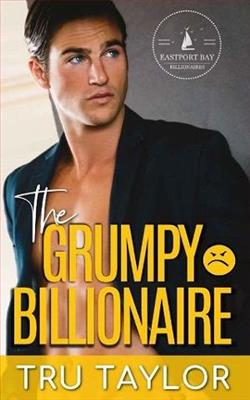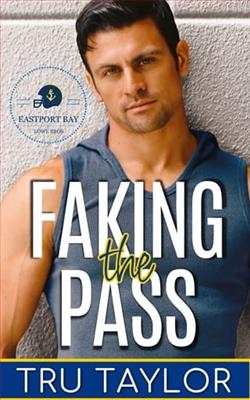Page 2 of Sweet (Contours of the Heart 3)
I’d ended up waitlisted at Harvard. My near-4.0 undergrad GPA and above-average MCAT scores weren’t the reason I’d failed to receive unconditional admittance. The premed associations I’d joined, the internships I’d completed, my sorority membership and exemplary letters of reference—these things weren’t at fault.
The determining factor had been my mouth, opening and closing in fishlike absurdity instead of giving a coherent answer to a perfectly standard question from the faculty member leading the interview.
“Ms. Frank,” she’d begun, raising her eyes from the paperwork on the table in front of her and pinning me with a focused smile, “tell us, please—what reservations might you have about joining the medical profession?”
There was nothing accusatory in her tone. She’d undoubtedly posed this question before and expected a competent, thoughtful answer in return. Here was the chance to affirm my desire to study medicine at a university that produces highly skilled physicians (such as Harvard). A nervous applicant might offer a chuckled comment about paying back formidable med-school loans. A self-confident candidate like my boyfriend, Mitchell, might declare: I have no reservations; I’ve always wanted to be a doctor.
Instead, all I could think was, I don’t want to. My mouth worked in desperation, trying to find other, more appropriate words to say, but they wouldn’t come.
I eventually blurted something inane, and after an awkward pause, the Q&A progressed to other interrogations. I made no further blunders as we discussed my premed preparations, methods of handling personal and educational challenges, and the ways I imagined the healthcare profession might change in the near future.
But in the taxi back to my hotel, all I could recall was that one question and the host of suitable answers I hadn’t given. Once in my room, I’d called Mitchell and answered his post-interview debriefing with a vague, “It was fine. I’m just sort of beat.” I couldn’t put my newfound self-awareness into words over the phone. When he didn’t press for performance specifics, I wasn’t sure if he believed I was too tired to elaborate or if he was merely preoccupied with his own interview schedule. He’d just returned from Durham and would be in Cambridge in two weeks. He’d want to dissect every aspect of Harvard’s interview process before he arrived.
I went to sleep hoping the whole thing was just passing insanity, but by the time Mitchell picked me up at the airport the next afternoon, I’d only grown more certain—I didn’t want to go to medical school. We’d planned our corresponding futures like we each planned everything else in our lives: every detail strategically premeditated, every probability accounted for. Except for the one where he went on to medical school and I… didn’t.
That night, over short ribs at Péché, I confided the truth to him.
Brows drawn, he finished chewing, wiped his fingers, and sipped his pisco sour before answering. “What do you mean, you don’t see yourself going to medical school? It sure sounds like you flubbed that interview—with Harvard too, Jesus—but you’ve got several others lined up. You’ll get in somewhere. Duke. Vanderbilt. UT Southwestern, if it comes to that. Stop being so defeatist.”
I’d been dating Mitchell for over a year, but I’d never been able to get used to his fallback insistence that I maintain a “positive attitude” whenever I raised a concern or wanted to discuss some apprehension. Optimism is all fine and good, but it has squat to do with solving problems. You’d think as a future doctor, he would know that. But then, sometimes it also seemed that the need for compulsory enthusiasm only applied to me.
“I’m not being defeatist, Mitchell. I’m trying to tell you that I don’t want to be a doctor—not a medical doctor, anyway. So it doesn’t matter whether I can get in or where.” I knew he was disappointed and probably shocked, so I gave him time to absorb the blow I’d just dealt our future together.
He was quiet for a full two minutes, and then—“Are you fucking kidding me?”
His set jaw and rigid gaze were all too familiar. Months before, we were alone in his dorm room, studying for an exam in organic chemistry, when I got a text from a guy in my technical-writing class. “Why are you getting a text from that guy?” he’d said.
“We’re friends. And he was texting me about an assignment, Mitchell.”
“Do I look stupid?” His face warmed to a livid red, spittle at the corner of his mouth and his fingers dug into my upper arms, immobilizing me. He glared at the phone in my hand. “Why won’t you fucking tell me what’s really going on?”
I gasped, my mouth hanging open. “Nothing is going on.” I jerked loose from his grip and stood, backing away, only to trip over his roommate’s shoes, fall backward, and collide with a desk chair on the way down.
Minutes later, while pressing an ice pack to the goose egg on the back of my skull, Mitchell apologized repeatedly. “I’m sorry—God, I’m so sorry—of course I trust you. These are my insecurities, leftovers from what Darla did to me, you know?” Darla—his freshman-year girlfriend who’d cheated on him with his best friend and broken his heart. “Please, Pearl. You know I didn’t mean for you to get hurt. I’ll never talk to you like that again, I swear.” His blue eyes were glassy with tears.
I’d forgiven him in the end, accepting his sworn promises.
“Are you. Fucking. Kidding me?” he repeated from across the table, snapping those months-old vows like they’d never been given.
Despite the music pumping through the packed restaurant and the voices raised in conversation all around us, the two women at an adjoining table heard him. Both went silent, sliding looks between each other and the developing scene at our table. Mortified, I sensed them deliberating whether or not to intervene. I hated being a spectacle almost as much as I hated what he’d said, and he knew it.
I leaned in, face on fire, voice low. “Mitchell, not here.”
“Not here?” He angled his head as if he was offended. “You decided to drop this on me here. Maybe you should have considered where you wanted to have this absurd discussion instead of trying to tell me how to react to the fact that my girlfriend is tossing her future away—and mine, by the way—like it’s no big deal.”
His words snuck under my arguments, igniting guilt that what I decided could alter the course of both our futures, not just mine.











